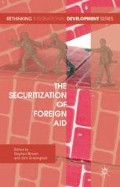Abstract
The terrorist attacks on the US in 2001 precipitated a new era of securitization of foreign aid. To differing extents, all of the country cases in this volume have increasingly linked their aid budgets with security concerns since then, albeit unevenly. Our goal has been to develop an enhanced understanding of this trend. However, as the contributors have individually and collectively demonstrated, nuance and context-specificity are vital. Even for a single donor government, generalizations can be difficult to make across institutions and programmes. Moreover, because of the variations between the cases, not all of our findings apply equally to all of them. Though we cannot offer facile assessments or easy answers, we hope to provide the reader with a broader perspective and heightened appreciation of the issues.
Access this chapter
Tax calculation will be finalised at checkout
Purchases are for personal use only
Preview
Unable to display preview. Download preview PDF.
References
Aning, Kwesi (2010) ‘Security, the War on Terror, and Official Development Assistance’, Critical Studies on Terrorism, 3.1: 7–26.
Call, Charles T. (2008) ‘The Fallacy of the “Failed State”’, Third World Quarterly, 29.8: 1491–507.
Call, Charles T. (2011) ‘Beyond the “Failed State”: Toward Conceptual Alternatives’, European Journal of International Relations, 17.2: 303–26
Duffield, Mark (2007) Development, Security and Unending War: Governing the World of Peoples. Cambridge, UK and Malden, MA: Polity.
Lancaster, Carol (2008) George Bush’s Foreign Aid: Transformation or Chaos? Washington, DC: Center for Global Development.
Nay, Olivier (2013) ‘Fragile and Failed States: Critical Perspectives on Conceptual Hybrids’, International Political Science Review, 34.3: 326–41.
OECD (2015) Query Wizard for International Development Statistics, http://stats.oecd.org/qwids/, accessed 14 March 2015.
Pratt, Cranford (1999) ‘Competing Rationales for Canadian Development Assistance: Reducing Global Poverty, Enhancing Canadian Prosperity and Security, or Advancing Global Human Security’, International Journal, 54.2: 306–23.
Schraeder, Peter J., Steven W. Hook, and Bruce Taylor (1998) ‘Clarifying the Foreign Aid Puzzle: A Comparison of American, Japanese, French and Swedish Aid Flows’, World Politics, 50. 2: 294–323.
Stokke, Olav and Jacques Forster (eds.) (1999) Policy Coherence in Development Co-operation. Portland, OR: Frank Cass.
Woods, Ngaire (2005) ‘The Shifting Politics of Foreign Aid’, International Affairs, 81.2:393–409.
Editor information
Editors and Affiliations
Copyright information
© 2016 Stephen Brown, Jörn Grävingholt and Rosalind Raddatz
About this chapter
Cite this chapter
Brown, S., Grävingholt, J., Raddatz, R. (2016). The Securitization of Foreign Aid: Trends, Explanations and Prospects. In: Brown, S., Grävingholt, J. (eds) The Securitization of Foreign Aid. Rethinking International Development Series. Palgrave Macmillan, London. https://doi.org/10.1007/978-1-137-56882-3_11
Download citation
DOI: https://doi.org/10.1007/978-1-137-56882-3_11
Publisher Name: Palgrave Macmillan, London
Print ISBN: 978-1-349-57809-2
Online ISBN: 978-1-137-56882-3
eBook Packages: Economics and FinanceEconomics and Finance (R0)

